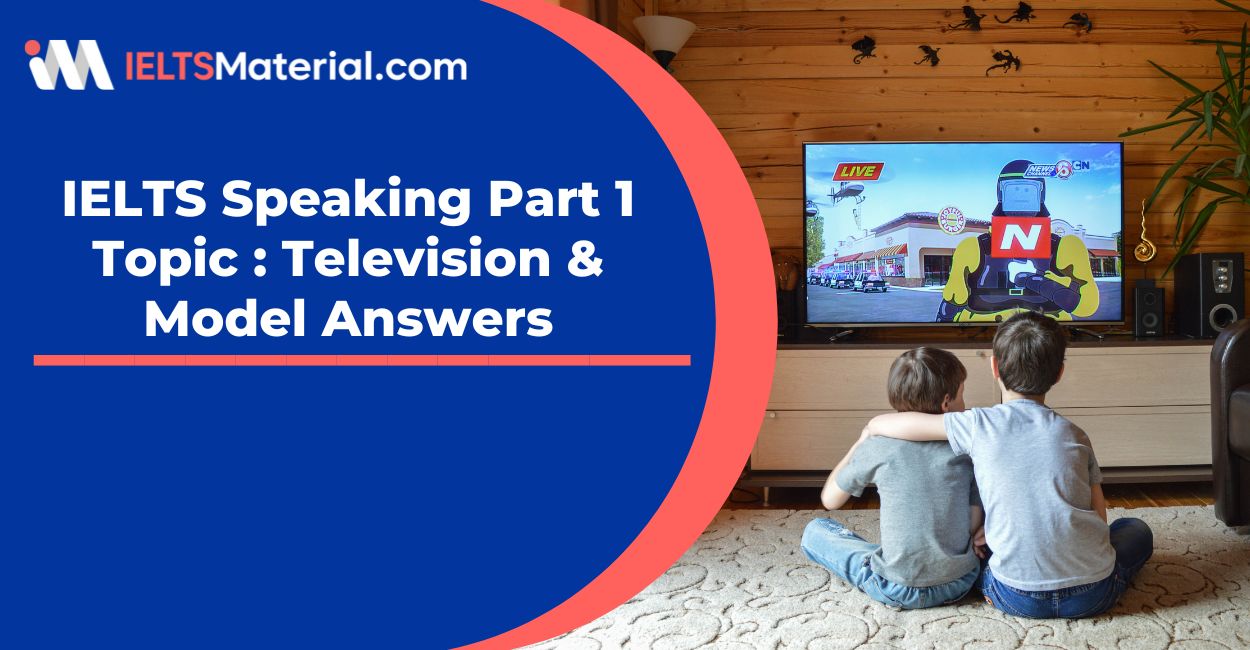Television or TV Programmes: IELTS Speaking Part 1 Model Answers
The article offers sample answers and relevant vocabulary for IELTS Speaking Part 1 on the topic of television or TV programmes. It emphasizes focusing on a single idea, using advanced vocabulary, and maintaining fluency.
Table of Contents
Get a Complimentary IELTS Speaking Strategies PDF
Television, often abbreviated as TV, has been an integral part of our lives for decades. It serves as a window to the world, providing entertainment, information, and education to millions of viewers globally. In the context of the IELTS Speaking Part 1, candidates are often asked questions about television and TV programmes to assess their fluency and vocabulary.
So, let's delve into some sample answers for TV Speaking IELTS Speaking Part 1 of the IELTS exam that can help candidates prepare effectively for this section of the IELTS exam.
Television or TV Programmes: IELTS Speaking Part 1
Let’s start with some sample responses to Part 1 speaking topic television or tv programmes related questions from the IELTS Speaking.
- Do you have a television?
Yes, I do have a television. It's a flat-screen LED TV that's mounted on the wall in my living room. It's a central piece of entertainment in my home, where friends and family gather to enjoy various TV programs together.
- Do you like watching tv?
Absolutely! Watching TV is one of my favorite pastimes. It's a great way to unwind after a long day, escape into different worlds, and explore a wide range of stories and characters. Whether it's catching up on the latest dramas, laughing at sitcoms, or learning something new from documentaries, there's always something enjoyable to watch on TV.
- Where do you usually watch tv programmes?
I usually watch TV programs in the comfort of my living room. It's where my television is set up, along with a cozy couch and some snacks within reach. Sometimes, if I'm on the go, I might watch TV programs on my tablet or laptop using streaming services. But nothing beats the experience of sitting in front of a big screen and immersing myself in the world of television.
- What kind of tv programs do you like to watch?/What kind of tv programs do you like?
I have quite a diverse taste when it comes to TV programs. I enjoy a mix of genres depending on my mood and interests. For instance, I love watching gripping dramas that keep me on the edge of my seat, like crime thrillers or character-driven narratives. Comedy shows are also a favorite, especially after a stressful day when I need a good laugh. Additionally, I find documentaries fascinating, whether they delve into history, science, or current events, as they often provide valuable insights and knowledge. Overall, I'm open to exploring different types of TV programs, as long as they're well-crafted and engaging.
Want to brush up your skills with speaking topic television or tv programmes?
- What’s your favourite TV program?
There are many documentaries on TV related to architecture. Because I’m an architect. And they always introduce some new approaches to construction and the latest materials which can be used. I used to read books. But now there are so many good videos online. I think they are more interesting and better.
OR
Being an architect, I used to not only read books but also watch TV documentaries in order to pick up information related to my field. My favorite TV series is “Live or Die” which has been aired since 2012 and helps me broaden my horizon in architecture. But, recently, because I found that the Internet is full of better material, I’ve been streaming videos, which is a much more efficient way to enhance my knowledge.
OR
Definitely music channels such as MTV or V-channel. These channels offer a wide variety of music every day. Also, they also interact with their audience by allowing them to vote for the Top 20 songs of each week or to play the songs they requested.
- When do you watch tv?/Do you often watch TV?
I prefer watching TV to surfing the Internet due to its selectivity and accessibility. Because the audience can be children, teenagers and families, the content of TV programs are examined carefully and a suitable time frame is arranged to avoid having negative impacts on them.
OR
I usually watch TV in the evenings after I've finished my work or other daily responsibilities. It's a relaxing way to wind down and transition into leisure time. However, I don't watch TV every single day; it depends on my schedule and what else I have going on. Some days, I might binge-watch a series over the weekend, while other times, I might only catch a few episodes during the week. It varies, but overall, I'd say I watch TV regularly enough to keep up with my favorite shows and discover new ones.
- Why do old people like to watch TV?
I reckon that TV plays an indispensable part in the elderly people’ lives because indulging themselves in TV programs can help them kill time when their children have a hectic life out there and can’t spend time on looking after them on a daily basis. Although nowadays TV can furnish the elderly with a multitude of programs such as documentaries and soap operas, they still need to be talked to and enjoy time with their children, which made TV not able to substitute for the real conservation with their family members like sons or grandsons.
- What types of tv programmes are popular in your country?
In my country, these days, reality shows and comedy shows are among the most popular TV programs. I guess it’s because its content is suitable for the audience of any age, from children to the elderly. The fans of reality shows feel interactive and familiar with the competitors while those of comedy shows generally want to be entertained with jokes and laughter.
- Do you ever watch foreign programs or films?
I did enjoy quite a lot of shows and programs, from music, movies, fashion, news and scientific documentaries since the foreign are so good at visual editing and content management. Most of them are in English because I’m more familiar with this language compared to French or Japanese.
- What (types of) programmes did you watch when you were a child?
Like other children, I watched a number of cartoons and music programs for children when I was a child. Tom and Jerry, Barbie, Disney series are my favourites which still get me excited whenever I see them on TV now. My mom said I also was kind of attracted to music programs for children that I focused on them completely while eating.
- Do you think television has changed in the past few decades?/ (Possibly) Do you think television has changed since you were a child?
Televisions indeed have been changing remarkably for the past few years. The technology has become so innovative and competitive to meet the customers’ high demand for entertainment. The variety of TV programs is no longer limited to the national level but has reached to a number of foreign countries, and is significantly diversifying in content for audience preference.
- Has television changed your life in any way?
I think watching TV has become a habit that I would hardly change. My family always watches the news while having dinner together. Personally, I’d love watching TV for relaxing after studying as well as keeping myself updated on showbiz, music, movies, landscape discoveries and fields of science. Thus, as long as I do not become a couch potato, TV has always played an important role in my life, making my life more colourful and opening in front of my eyes the places I’ve never been to.
Grab our much- popular Speaking ebook before it sells out!
Television or TV Programmes: IELTS Speaking Part 1 Vocabulary
Let us now look at IELTS Speaking vocabulary that has been used in the answers above and you can use in your answers.
- Documentary
Meaning: a non-fictional film or television program that presents factual information about a particular subject, often with the aim of educating or informing viewers
Example: My brother likes to watch documentaries on the weekend.
- Kill time
Meaning: to spend time in a relaxed or leisurely manner, typically while waiting for something or to pass idle time
Example: We decided to kill time by roaming around in the streets before the movie.
- Remote control
Meaning: a handheld device used to wirelessly control the functions of a television, DVD player, or other electronic devices from a distance
Example: The siblings had a fight regarding who will have the remote control.
- Channel surfing
Meaning: the practice of quickly switching between different television channels in order to find something interesting to watch
Example: The old man is busy channel surfing to find the right show for the family.
- Innovative
Meaning: to be developed in the technology or in any field
Example: The company has come up with an innovative idea of using mobile phones.
- To meet one’s demand on something
Meaning: to provide someone with something/to provide something for someone
Example: The teacher is liked as she meets every child’s demand for lessons.
- Diversify
Meaning: to vary, to have many choices available
Example: They are trying to diversify their income sources.
- Couch potato
Meaning: a person who is addicted to watching TV
Example: Rob is a couch potato and is very lazy.
- Unwind/Wind down
Meaning: to relax and reduce stress or tension, often after a busy or stressful day
Example: At night, I watch a movie to unwind/wind down after a long day.
- Sitcoms
Meaning: a genre of television comedy series that typically features a recurring cast of characters in humorous situations, often set in a domestic or workplace environment
Example: Friends and The Office are popular sitcoms known for their witty humor and relatable characters.
- Keep on the edge of seat
Meaning: to keep someone in a state of suspense, excitement, or anticipation, typically by presenting a gripping or suspenseful storyline
Example: The plot of the thriller kept us on the edge of our seats the whole time.
- Aired
Meaning: broadcasting or transmission of a television program, movie, or radio show
Example: The show was last aired on 10th September.
- Broaden my horizon
Meaning: to expand one's knowledge, experiences, or perspectives by exposing oneself to new ideas, cultures, or activities
Example: Traveling to different countries has helped me broaden my horizons and appreciate diverse cultures.
- Streaming
Meaning: the process of transmitting or receiving multimedia content, such as audio or video, over the internet in real-time, allowing users to access and consume the content without downloading it
Example: Kiri prefers streaming movies and TV shows on platforms like Netflix or Amazon rather than buying physical DVDs.
Tips to Answer Television or TV Programmes: IELTS Speaking Part 1 Questions
Now, check out some topic specific IELTS Speaking tips to answer television or TV programmes-related questions in the IELTS Speaking Part 1.
- Explain your choice in detail: Give particular examples rather than merely mentioning the type when asked about your favorite TV shows. For example, you may say, "I really enjoy watching sitcoms like Friends or The Office because of their witty humor and relatable characters," in place of "I like comedies."
- Back up your preference with reasoning and examples: Whenever you can, give a reason for your preferences or dislikes for particular TV shows. This adds nuance to your responses and shows that you can articulate your thoughts. As an instance, "I find documentaries fascinating because they offer valuable insights into different cultures and lifestyles, helping me broaden my understanding of the world."
- Use vocabulary related to television and tv programmes: Incorporate IELTS vocabulary specific to television and TV programmes, such as ‘prime time’, ‘reruns’, ‘season finale’, ‘plot twists’, etc. This showcases your ability to use a wide range of vocabulary accurately and appropriately.
- Discuss Trends and Preferences: If asked about television viewing habits or trends, you can talk about general preferences among viewers, such as the growing popularity of streaming services over traditional cable TV, binge-watching habits, or the impact of reality TV shows on society.
- Provide Balanced Responses: While it's okay to express personal preferences, try to provide a balanced view by acknowledging different perspectives. For example, if you're asked about the influence of TV on children, you could discuss both the educational benefits of certain programs and the potential negative effects of excessive screen time.
Make Your Speaking Skills Stand Out with IELTSMaterial
Speaking well involves more than just being fluent and confident. You also have to express your ideas concisely, use a variety of language, and proper IELTS grammar. Achieving all these on your own through just practicing IELTS Speaking practice tests might be a little challenging.
So, you can connect with our IELTS experts or join the free webinars for tips to take your IELTS Speaking preparation to the next level!
Additional Reads
- 151 IELTS Speaking Topics Part 2 & 3 with Model Answers
- Mastering IELTS Speaking: Learning Fluency and Coherence
- 50 Recent IELTS Speaking Part 2 and 3 Topics with Model Answers for IELTS 2024
- Social Media - IELTS Speaking Part 1 with Sample Answers
- IELTS Pronunciation Guide
- Common English words in IELTS Speaking
- Ough words
- IELTS Study Plan for 1 month (30 Days) / 15 Days / 7 Days
- Idioms for IELTS Speaking
- Linking words for IELTS Speaking
- IELTS Speaking recent actual test
Bonus IELTS Speaking part questions with Answers
Explore other Speaking Part 1 Topics
Kasturika Samanta

Janice Thompson

Janice Thompson
Recent Articles
Janice Thompson

Kasturika Samanta

Raajdeep Saha





Post your Comments
1 Comment